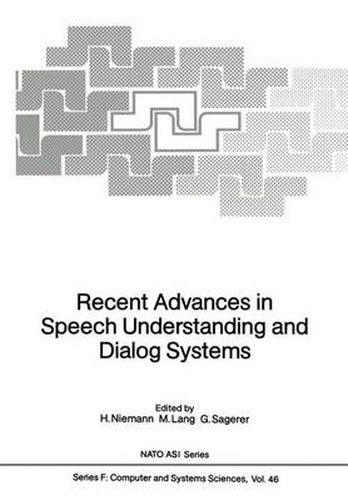Readings Newsletter
Become a Readings Member to make your shopping experience even easier.
Sign in or sign up for free!
You’re not far away from qualifying for FREE standard shipping within Australia
You’ve qualified for FREE standard shipping within Australia
The cart is loading…






This title is printed to order. This book may have been self-published. If so, we cannot guarantee the quality of the content. In the main most books will have gone through the editing process however some may not. We therefore suggest that you be aware of this before ordering this book. If in doubt check either the author or publisher’s details as we are unable to accept any returns unless they are faulty. Please contact us if you have any questions.
This volume contains invited and contributed papers presented at the NATO Advanced study Insti tute on Recent Advances in Speech Understanding and Dialog systems held in Bad Windsheim, Federal Republic of Germany, July 5 to July 18, 1987. It is divided into the three parts Speech coding and Segmentation, Word Recognition, and Linguistic Processing. Although this can only be a rough organization showing some overlap, the editors felt that it most naturally represents the bottom-up strategy of speech understanding and, therefore, should be useful for the reader. Part 1, SPEECH CODING AND SEGMENTATION, contains 4 invited and 14 contributed papers. The first invited paper summarizes basic properties of speech signals, reviews coding schemes, and describes a particular solution which guarantees high speech quality at low data rates. The second and third invited papers are concerned with acoustic-phonetic decoding. Techniques to integrate knowledge sources into speech recognition systems are presented and demonstrated by experimental systems. The fourth invited paper gives an overview of approaches for using prosodic knowledge in automatic speech recogni tion systems, and a method for assigning a stress score to every syllable in an utterance of German speech is reported in a contributed paper. A set of contributed papers treats the problem of automatic segmentation, and several authors successfully apply knowledge-based methods for interpreting speech signals and spectrograms. The last three papers investigate phonetic models, Markov models and fuzzy quantization techniques and provide a transi tion to Part 2 .
$9.00 standard shipping within Australia
FREE standard shipping within Australia for orders over $100.00
Express & International shipping calculated at checkout
This title is printed to order. This book may have been self-published. If so, we cannot guarantee the quality of the content. In the main most books will have gone through the editing process however some may not. We therefore suggest that you be aware of this before ordering this book. If in doubt check either the author or publisher’s details as we are unable to accept any returns unless they are faulty. Please contact us if you have any questions.
This volume contains invited and contributed papers presented at the NATO Advanced study Insti tute on Recent Advances in Speech Understanding and Dialog systems held in Bad Windsheim, Federal Republic of Germany, July 5 to July 18, 1987. It is divided into the three parts Speech coding and Segmentation, Word Recognition, and Linguistic Processing. Although this can only be a rough organization showing some overlap, the editors felt that it most naturally represents the bottom-up strategy of speech understanding and, therefore, should be useful for the reader. Part 1, SPEECH CODING AND SEGMENTATION, contains 4 invited and 14 contributed papers. The first invited paper summarizes basic properties of speech signals, reviews coding schemes, and describes a particular solution which guarantees high speech quality at low data rates. The second and third invited papers are concerned with acoustic-phonetic decoding. Techniques to integrate knowledge sources into speech recognition systems are presented and demonstrated by experimental systems. The fourth invited paper gives an overview of approaches for using prosodic knowledge in automatic speech recogni tion systems, and a method for assigning a stress score to every syllable in an utterance of German speech is reported in a contributed paper. A set of contributed papers treats the problem of automatic segmentation, and several authors successfully apply knowledge-based methods for interpreting speech signals and spectrograms. The last three papers investigate phonetic models, Markov models and fuzzy quantization techniques and provide a transi tion to Part 2 .